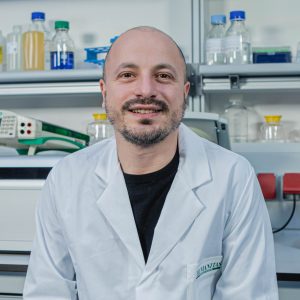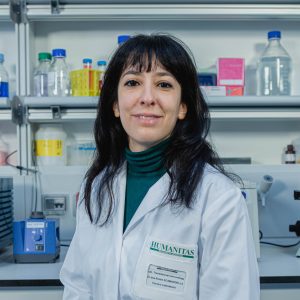Research Group
Lugli Group
Translational Immunology Lab
The group applies high-dimensional approaches – such as single cell RNA sequencing, 30-parameter flow cytometry, spatial profiling and computational biology – to dissect the complexity of the immune system at the level of single cells, with the final aim to exploit memory T cell responses in cancer immunotherapy approaches.
The challenge
Immune checkpoint inhibitors have definitively proven that the immune system can mediate cancer regression. However, not all patients respond to therapies. This is in part due to the complexity of immune responses: there are several different subsets of T cells infiltrating human cancers, each one with different characteristics and potency against tumor cells. The only way to improve current therapies and identify novel targets is to dissect such complexity. By combining single cell approaches and advanced computational methods, we are now able to map immune activity in patients’ samples and identify T cell populations that can mediate regression of established tumors.
Main research areas
Stem-like memory T cell differentiation in cancer immunotherapy
Following our original studies on the identification of T stem cell memory cells (Gattinoni, Lugli et al., Nat Med, 2011; Lugli, et al., J Clin Invest, 2013), we were the first to show that a subset with enhanced functionality and stem-like properties exists among PD-1+ exhausted T cells in human tumors (Brummelman et al., J Exp Med, 2018). More recently, by using omics technologies, we have redefined the model of memory T cell differentiation in humans by reporting the existence of two subsets of stem-like T cell progenitors with parallel differentiation programs and distinct fate commitments, functional vs. dysfunctional (Galletti et al., Nature Immunol, 2020). Once acquired, these traits of dysfunction cannot be reverted: they are “hard-wired” to the differentiation program. Our major question is now to define the niche of stem-like subsets in tumor tissues to understand how stromal, tumoral and immune cells regulate their differentiation and function.
Immunosuppression in the tumor microenvironment
The landscape of immune cells infiltrating tumors is highly complex. We recently identified unprecedented cellular players mediating immunosuppression and driving disease progression in the microenvironment of several human cancers. We found that the differentiation and function of a subset of highly suppressive effector regulatory T (Treg) cells governs disease progression in several human tumors (Alvisi et al., J Clin Invest, 2020), including cholangiocarcinoma (Alvisi et al., J Hepatol, 2022). A major question is how Tregs sustain chronic activation and resist exhaustion and senescence. We will address this by using novel sequencing and proteomic technologies applied to primary patients’ samples.
Selected publications
Acquisition of suppressive function by conventional T cells limits antitumor immunity upon T(reg) depletion.
CRUSTY: a versatile web platform for the rapid analysis and visualization of high-dimensional flow cytometry data.
Multimodal single-cell profiling of intrahepatic cholangiocarcinoma defines hyperactivated Tregs as a potential therapeutic target.
‘Stem-like’ precursors are the fount to sustain persistent CD8(+) T cell responses.
Two subsets of stem-like CD8(+) memory T cell progenitors with distinct fate commitments in humans.
Defining ‘T cell exhaustion’.
High-dimensional single cell analysis identifies stem-like cytotoxic CD8(+) T cells infiltrating human tumors.
Antioxidant metabolism regulates CD8+ T memory stem cell formation and antitumor immunity.
Role of naive-derived T memory stem cells in T-cell reconstitution following allogeneic transplantation.
Redistribution, hyperproliferation, activation of natural killer cells and CD8 T cells, and cytokine production during first-in-human clinical trial of recombinant human interleukin-15 in patients with cancer.
A human memory T cell subset with stem cell-like properties.
Group members















